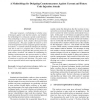Free Online Productivity Tools
i2Speak
i2Symbol
i2OCR
iTex2Img
iWeb2Print
iWeb2Shot
i2Type
iPdf2Split
iPdf2Merge
i2Bopomofo
i2Arabic
i2Style
i2Image
i2PDF
iLatex2Rtf
Sci2ools
109
Voted
IWIA
2005
IEEE
2005
IEEE
A Methodology for Designing Countermeasures against Current and Future Code Injection Attacks
This paper proposes a methodology to develop countermeasures against code injection attacks, and validates the methodology by working out a specific countermeasure. This methodology is based on modeling the execution environment of a program. Such a model is then used to build countermeasures. The paper justifies the need for a more structured approach to protect programs against code injection attacks: we examine advanced techniques for injecting code into C and C++ programs and we discuss state-ofthe-art (often ad hoc) approaches that typically protect singular memory locations. We validate our methodology by building countermeasures that prevent attacks by protecting a broad variety of memory locations that may be used by attackers to perform code injections. The paper evaluates our approach and discusses ongoing and future work.
| Added | 25 Jun 2010 |
| Updated | 25 Jun 2010 |
| Type | Conference |
| Year | 2005 |
| Where | IWIA |
| Authors | Yves Younan, Wouter Joosen, Frank Piessens |
Comments (0)

